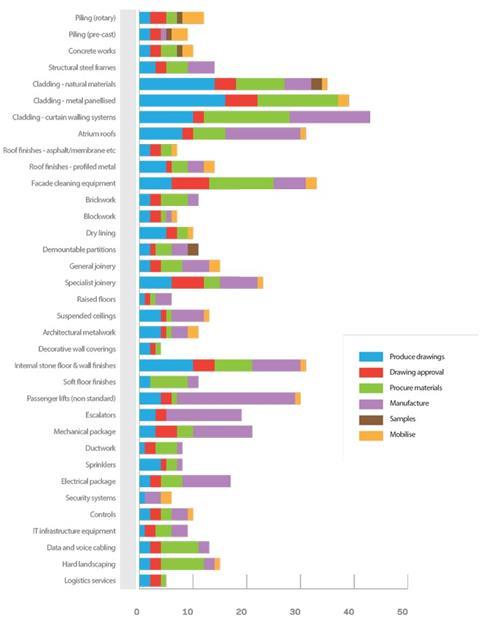Increases to lead times continue, albeit to a smaller number of trades than seen in previous quarters. The major issue forecast going forward is labour shortages
01 / Going up
▲ Concrete works
▲ Specialist joinery
▲ Soft floor finishes
▲ Mechanical package
02 / Staying level
▶ Piling (rotary)
▶ Piling (pre-cast)
▶ Structural steel frames
▶ Cladding – natural materials
▶ Cladding – metal panellised
▶ Cladding – curtain walling systems
▶ Atrium roofs
▶ Roof finishes – asphalt/membrane
▶ Roof finishes – profiled metal
▶ Facade cleaning equipment
▶ Brickwork
▶ Blockwork
▶ Drylining
▶ Demountable partitions
▶ General joinery
▶ Raised floors
▶ Suspended ceilings
▶ Architectural metalwork
▶ Decorative wall coverings
▶ Internal stone floor and wall finishes
▶ Passenger lifts (non-standard)
▶ Escalators
▶ Electrical package
▶ Ductwork
▶ Sprinklers
▶ Security systems
▶ Controls
▶ Data and voice cabling
▶ Hard landscaping
▶ Logistics services
03 / Lead times summary
Rotary piling ▶ Following a period of increase, lead times have not changed this quarter and remain at 12 weeks. Availability of steel reinforcement and labour is being forecast as a potential problem going forward.
Pre-cast piling ▶ Remains at nine weeks with no change forecast despite being busier.
Concrete works ▲ The forecast increase in workload has materialised in lead times extending by two weeks to 10 weeks. Some specialist contractors anticipate further increases over the next six months.
Structural steel frames ▶ Lead times remain at 14 weeks. No change anticipated.
Cladding – natural materials ▶ No change in lead times have been reported and remain at 35 weeks.
Cladding – metal panelised system ▶ Lead times remain at 39 weeks with contractors reporting being busier and anticipating longer lead times.
Cladding – curtain walling system ▶ Lead times remain at 43 weeks. Workload and enquiries continue to increase and contractors anticipate lead times increasing over the next six months. Contractors anticipate labour shortages over the next 12 months.
Atrium roofs ▶ Lead times remain at 31 weeks with no changes reported.
Roof finishes – asphalt / membrane ▶ Lead times remain at seven weeks.
Roof finishes – profiled metal ▶ Lead times remain at 14 weeks. No increases anticipated.
Facade cleaning equipment ▶ Lead times remain at 33 weeks. Firms are busier and have more enquiries than six months ago but don’t anticipate any changes.
Brickwork ▶ Lead times remain at 11 weeks. As availability of bricks begins to recover labour is forecast to be in demand. No changes in lead times anticipated over the next six months.
Blockwork ▶ Lead times remain at seven weeks.
Drylining ▶ Lead times remain at 10 weeks. Increases are anticipated in the next six months as workload increases and skilled labour is in short supply.
Demountable partitions ▶ Lead times remain at 11 weeks following a series of increases over the past six months, No further increases are anticipated.
General joinery ▶ Lead times remain at 15 weeks following an increase of one week last quarter. Despite being busier with enquiries lead times are not anticipated to increase. Specialist joinery ▲ The increased workload reported last quarter has materialised in a three-week increase in lead times to 23 weeks. No further change is forecast.
Raised floors ▶ Lead times remain at six weeks with no changes reported.
Suspended ceilings ▶ Lead times remain at 13 weeks with no increase forecast for the next six months despite shortages in skilled labour.
Architectural metalwork ▶ Lead times remain at 11 weeks. Despite being busier there is no increase forecast for the next six months.
Decorative wall coverings ▶ Lead times remain at four weeks.
Internal stone floor and wall finishes ▶ Lead times remain at 31 weeks. Further increases are anticipated over the next six months.
Soft floor finishes ▲ As previously forecast, lead times have risen by one week to 11 weeks due to increases in workload with further increases anticipated over the next six months. Labour shortages are forecast in the next six months.
Passenger lift (non-standard) ▶ Lead times remain at 30 weeks.
Escalators ▶ Lead times remain at 19 weeks.
Electrical package ▶ Lead times remain at 17 weeks following the increase last quarter.
Mechanical package ▲ Lead times have increased for the third quarter with an increase of one week to 21 weeks. Contractors are busier and anticipate a further increase in the next six months.
Ductwork ▶ The lead time for ductwork remains at eight weeks with no change forecast.
Sprinklers ▶ Lead times remain at eight weeks.
Security systems ▶ Lead times remain at six weeks. Trained engineers are in short supply which may lead to increases in lead times.
Controls ▶ Lead times remain at 10 weeks.
IT infrastructure equipment ▶ Lead times remain at nine weeks. Increases to lead times are anticipated in the next six months.
Data and voice cabling ▶ Lead times remain at 13 weeks with increases forecast. Availability of project managers and skilled labourers is seen as a problem over the next six months.
Hard landscaping ▶ Lead times remain at 15 weeks. No further change is forecast in the next six months.
Logistics services ▶ Lead times remain at five weeks. Despite being busier with enquiries and work there is no change forecast in the next six months.

























No comments yet